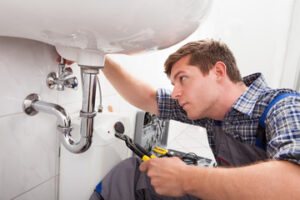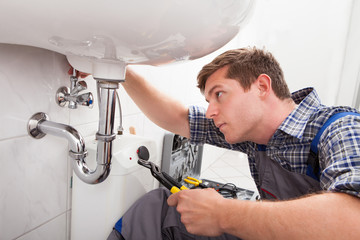Plumbers Bradenton play a crucial role in maintaining the comfort and safety of homes and businesses. A well-functioning plumbing system ensures clean water access and proper waste disposal. Without efficient plumbing, daily activities become difficult and inconvenient. Professional plumbers keep these systems running smoothly.
Modern plumbing systems are complex and require specialized knowledge. Plumbers handle installation, repair, and maintenance of water lines, fixtures, and drainage systems. They use advanced tools and techniques to identify and resolve issues quickly. Their expertise ensures the system functions efficiently and safely.
Leaks are one of the most common plumbing issues. Even small leaks can lead to significant water damage over time. Plumbers use pressure tests and specialized equipment to detect hidden leaks. Prompt repairs prevent structural damage and mold growth.
Clogged drains are another frequent problem. Hair, grease, and debris can build up and block pipes. Plumbers use high-pressure water jets and drain snakes to clear obstructions. Effective cleaning restores proper drainage and prevents backups.
Water heater malfunctions can disrupt daily routines. Plumbers inspect heating elements, thermostats, and pressure valves to diagnose issues. Repairs or replacements restore hot water access. Efficient water heaters improve comfort and reduce energy costs.
Frozen pipes are a major concern in cold weather. Ice expands and can cause pipes to burst, leading to flooding. Plumbers insulate pipes and install heating elements to prevent freezing. Quick intervention minimizes damage and repair costs.
Installing new fixtures requires precision and expertise. Plumbers ensure proper alignment and secure connections. Leaks and pressure issues can result from improper installation. Professional work guarantees long-lasting performance.
Toilet problems can range from clogs to leaks. Plumbers assess the issue and repair or replace damaged components. Flapper valves, fill mechanisms, and seals are common points of failure. Restoring proper function improves hygiene and convenience.
Sewer line issues can cause unpleasant odors and backups. Plumbers use camera inspections to locate blockages or damage. Tree roots, shifting soil, and corrosion are common causes. Targeted repairs restore proper flow and prevent contamination.
Gas line installation and repair require specialized skills. Improper work can lead to dangerous leaks and explosions. Plumbers follow strict safety protocols and use advanced leak detection methods. Safe installation ensures reliable gas supply and household safety.
Backflow prevention protects drinking water from contamination. Plumbers install check valves and test backflow systems regularly. Cross-connections between drinking and wastewater lines can pose health risks. Proper backflow prevention ensures clean water access.
Plumbers also install and maintain sump pumps. These systems prevent basement flooding by removing excess water. Plumbers check float switches, discharge lines, and power sources for proper function. Effective sump pumps protect against water damage.
Water pressure problems can affect appliance performance and comfort. Plumbers inspect pipes, valves, and pressure regulators to identify issues. Adjustments or replacements restore consistent pressure. Proper water pressure improves showering and appliance efficiency.
Plumbing inspections help prevent costly repairs. Plumbers assess pipe condition, joint integrity, and fixture performance. Early detection of corrosion or leaks prevents major issues. Regular inspections improve system longevity and efficiency.
Eco-friendly plumbing solutions reduce water and energy consumption. Plumbers install low-flow fixtures, water-saving toilets, and efficient heaters. Leak detection and repair further reduce waste. Sustainable plumbing solutions lower utility costs and environmental impact.
Water softeners improve water quality and protect plumbing systems. Hard water causes scale buildup in pipes and appliances. Plumbers install and maintain softening systems to prevent damage. Softer water enhances cleaning and extends appliance life.
Installing outdoor plumbing requires specialized knowledge. Sprinkler systems, hose bibs, and outdoor sinks need proper drainage and pressure regulation. Plumbers ensure connections are secure and resistant to weather conditions. Well-installed outdoor plumbing enhances convenience and functionality.
Plumbers handle complex bathroom and kitchen renovations. Moving water lines and installing new fixtures requires careful planning. Plumbers work with contractors to ensure proper alignment and sealing. Professional installation prevents future leaks and pressure issues.
Plumbing for commercial properties involves large-scale systems. High-capacity pipes, water heaters, and drainage systems require precise installation. Plumbers design and maintain these systems to handle heavy usage. Efficient commercial plumbing ensures uninterrupted operation.
Emergency plumbing services are essential for sudden issues. Burst pipes, sewage backups, and water heater failures require immediate attention. Plumbers respond quickly to prevent further damage. Fast repairs restore safety and functionality.
Installing and maintaining water filtration systems improves water quality. Plumbers assess water sources and install appropriate filters. Sediment, chlorine, and contaminants are removed for cleaner water. Regular maintenance ensures continued filtration performance.
Drain venting is crucial for proper drainage. Plumbers install and maintain vent pipes to prevent airlocks and slow drainage. Proper venting reduces noise and prevents odors. Well-vented drains improve overall system function.
Plumbing codes and regulations ensure safety and efficiency. Plumbers stay updated on building codes and industry standards. Compliance ensures safe installation and operation. Professional work meets legal and safety requirements.
Water conservation strategies reduce waste and lower costs. Plumbers install dual-flush toilets, flow restrictors, and efficient fixtures. Fixing leaks and improving water pressure further conserves resources. Efficient plumbing supports sustainable living.
Underground plumbing repairs require specialized equipment. Plumbers use trenchless repair methods to minimize disruption. Pipe relining and directional drilling reduce excavation. Advanced techniques restore function with minimal surface damage.
Plumbing maintenance agreements provide ongoing support. Plumbers offer regular inspections and priority service for members. Early detection of issues prevents costly repairs. Maintenance plans ensure long-term system health.
Installing greywater systems reduces water waste. Plumbers design and install systems that reuse water from sinks and showers. Treated greywater supports irrigation and non-potable use. Efficient greywater systems lower utility costs and support sustainability.
Fixture upgrades enhance both style and function. Plumbers install modern faucets, sinks, and showers. Touchless and water-saving models improve convenience and efficiency. Stylish fixtures elevate the overall design of the space.
Septic system maintenance is essential for rural properties. Plumbers pump tanks, inspect drain fields, and clear blockages. Regular maintenance prevents backups and system failures. Well-maintained septic systems ensure proper waste management.
Water pipe replacement improves flow and quality. Corroded or damaged pipes restrict water pressure and cause discoloration. Plumbers use durable materials for replacements. New piping ensures consistent pressure and clean water.
Installing pressure regulators protects plumbing systems. High water pressure strains pipes and fixtures. Plumbers install regulators to maintain safe levels. Proper pressure regulation extends the life of the plumbing system.
Flood prevention systems provide added protection. Plumbers install check valves and flood sensors in vulnerable areas. Early detection and automatic shutoff prevent water damage. Proactive flood prevention increases peace of mind.
Plumbing renovations increase property value. Updated fixtures, efficient systems, and modern layouts attract buyers. Professional installation ensures reliability and longevity. Thoughtful plumbing upgrades enhance both function and market appeal.
Hot water circulation systems improve convenience. Plumbers install pumps that keep hot water moving through pipes. Faster hot water access reduces waste and improves comfort. Circulation systems increase energy efficiency.
Noise reduction in plumbing systems enhances comfort. Plumbers install insulation and adjust pipe alignment to reduce noise. Water hammer arrestors prevent banging and vibration. Quieter systems improve the overall home environment.
Plumbing upgrades support smart home integration. Plumbers install Wi-Fi-connected leak detectors, water heaters, and shutoff valves. Remote monitoring and control improve convenience and safety. Smart plumbing systems increase efficiency and responsiveness.
Plumbers play a vital role in maintaining health and comfort. Their expertise ensures safe water access and waste removal. Professional maintenance prevents costly damage and improves system longevity. Investing in quality plumbing supports long-term home performance.



